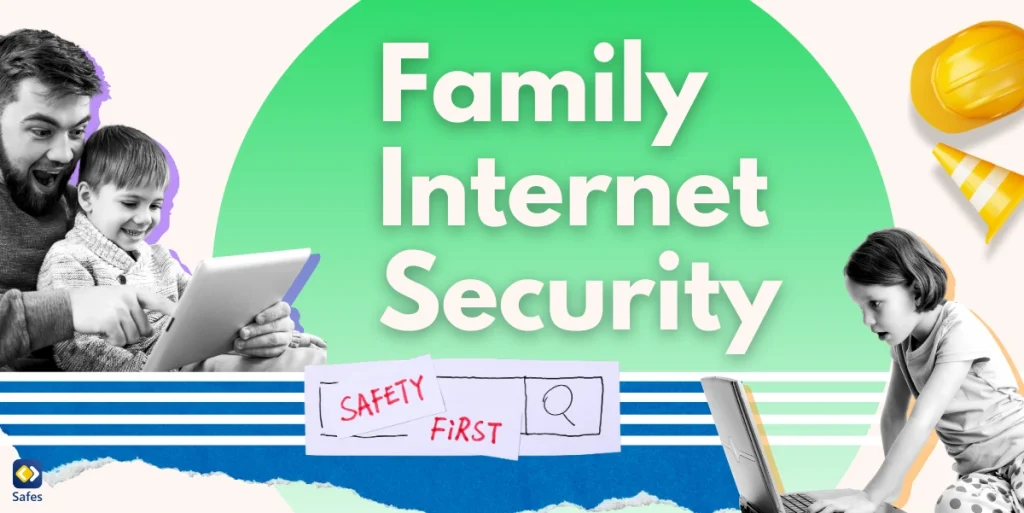If you, like many parents, are worried about the content your family members, especially your kids, might come across or the people they may interact with online, you’re in the right place! From harmful websites to cyberbullying, the internet contains various potential threats that can be harmful to many users. However, the good news is that there are practical and simple steps to increase your family’s online security and make a safe and healthier online environment. In this blog, we will focus on the family internet security, explaining everything you need to know. So first, let’s start with why it has become a big concern nowadays.
Download and Start Your Free Trial of the Safes Parental Control App
Why Does Family Internet Security Matter?
While a good place to learn new things, the internet can be unsafe, especially for children. Kids might see harmful content, talk to strangers, or even be targeted by people who want to hurt them. Cyberbullying, scams, and privacy issues are also real risks that can affect kids and adults alike. With several steps to protect your family online, you can keep your family members safe from these risks. It also teaches them how to use the internet in a smart and responsible way. When you make internet security a priority, you help your children explore the web safely and confidently.

What Are the Best Family Internet Security Solutions?
As technology continues to progress, more tools for protecting and securing vulnerable users are emerging. Among these different ways and tools, you need to choose the one that best fits your criteria. According to an article about cyber-security in families, the way you implement internet security depends on your parenting style. You may find strict limitations and security measures necessary or prefer explanatory and supportive methods.
Using a combination of the solutions we explained below can significantly your family’s internet security, providing peace of mind and a safer online environment for everyone.
Antivirus Software
Antivirus is a crucial tool for protecting all family devices from malware, viruses, and other online threats. These internet dangers are aimed at destroying a device’s function, accessing or removing information. These tools can block harmful sites and prevent cyber attacks.
Virtual Private Networks (VPNs)
A VPN, or Virtual Private Network, encrypts your family’s internet connection, making it harder for hackers to intercept your data. VPN services offer a secure browsing experience and can protect your privacy when using public Wi-Fi. Also, by masking your IP address, a VPN helps prevent tracking and targeted ads.
Firewalls
Firewalls act as a barrier between your home network and potential threats from the internet. They block unauthorized access to your network and can be either software-based or hardware-based. Many routers have built-in firewalls, but you can also add external ones for extra security. Setting up a firewall helps in preventing attacks and keeping your family’s online activities safe.
Router-Based Controls
There are several modern WiFi routers with parental controls that allow you to manage internet access across all devices in your home. Routers like Google Nest Wifi enable you to filter content, set time limits, and monitor usage from a single dashboard. This centralized control makes it easier to enforce rules and ensure a safe online environment for everyone in the family.
Password Managers
Password managers create and store strong, unique passwords for all your online accounts. By reducing the risk of using weak or repeated passwords, these tools enhance your family’s security. They also offer features like automatic password generation and secure sharing options, making it easier to manage your digital security.
Safe Browsing Settings
Most modern browsers have built-in safe browsing settings that can filter out inappropriate content and enhance security. For example, Google SafeSearch helps block explicit content in search results, while browser extensions can add additional layers of protection. Configuring these settings ensures a safer browsing experience for your children.
Parental Control Tools
Among the ways we mentioned earlier, tools for parental monitoring for internet have proved to be very practical and helpful. They are essential for managing what your children can access online by setting restrictions on websites, monitoring screen time, and blocking inappropriate content. These programs often come with features like activity reports and real-time alerts, helping you keep a close eye on your child’s internet use and adjust settings as needed.

How Do Parental Control Tools Work?
Parental control tools are a type of family internet security software that helps parents manage and monitor what their kids do online. These tools allow you to block harmful websites, limit screen time, and even track what your child is watching or downloading. Some tools can also prevent children from talking to strangers or accessing certain apps without your permission.
You can set different rules for each child based on their age. For example, you might allow more internet time for older kids or block certain apps for younger ones. Parental control tools give you the power to create a safer online space for your children while still letting them enjoy the internet.
Final Word
Nowadays, internet security and family protection are more important than ever. Make sure to use the family internet security methods that we mentioned throughout the blog and protect your loved ones from the many risks of the internet. We also explained that another effective tool is a parental control tool. That is what Safes, our comprehensive parental control app, is here for! Safes offers features like web filtering, app management, and real-time monitoring to ensure your children are safe in the online world. It functions similarly to Macbook parental controls but with more features and access.
Don’t wait to take control of your family’s internet safety. Download Safes for Android and iOS and start your free trial to experience the benefits firsthand.
Your Child’s Online Safety Starts Here
Every parent today needs a solution to manage screen time and keep their child safe online.
Without the right tools, digital risks and excessive screen time can impact children's well-being. Safes helps parents set healthy boundaries, monitor activity, and protect kids from online dangers—all with an easy-to-use app.
Take control of your child’s digital world. Learn more about Safes or download the app to start your free trial today!



